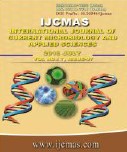


 National Academy of Agricultural Sciences (NAAS)
National Academy of Agricultural Sciences (NAAS)

|
PRINT ISSN : 2319-7692
Online ISSN : 2319-7706 Issues : 12 per year Publisher : Excellent Publishers Email : editorijcmas@gmail.com / submit@ijcmas.com Editor-in-chief: Dr.M.Prakash Index Copernicus ICV 2018: 95.39 NAAS RATING 2020: 5.38 |
MRSA has become a leading cause of infections in both the community and in hospitals. Healthcare-associated MRSA (HA-MRSA) are the strains that circulate and are transmitted to individuals within health care facilities. The infected or colonized patients serve as the major reservoirs of MRSA in health care facilities. Transient carriage of MRSA on the hands of health care workers is the predominant mode of transmission from health care workers to patients and further from one patient to other patient. Our aim was to compare the prevalence of MRSA carriage among health care workers serving in different areas (Ward, ICU, Recovery and Emergency) of cardiac unit. This prospective study was conducted in the Department of Microbiology, Dayanand Medical College and Hospital, Ludhiana on 250 health care workers serving in different areas of cardiac unit. Screening was done by collecting swabs from hands and anterior nares. The specimens were processed by standard procedures for the isolation of S. aureus and methicillin resistance was determined using cefoxitin, 30µg disks as per Clinical and Laboratory Standards Institute (CLSI) guidelines. Highest percentage of MRSA carriage was seen among the subjects working in recovery area (14%). The prevalence of MRSA among the subjects working in emergency, wards and ICUs was found to be 12%, 8% and 5% respectively. The healthcare personnel require awareness regarding the nosocomial infections as well as bacterial colonization and should know their status of MRSA carriage and accordingly, take necessary measures to prevent possible transmission. Therefore, a continuous surveillance and improvement of hygiene standards in hospitals should be adopted.
 |
 |
 |
 |
 |